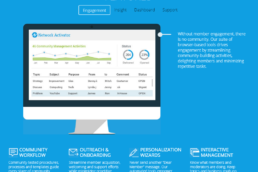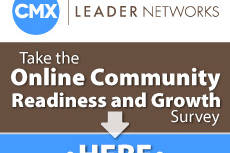 In honor of this week’s Community Manager Appreciation Day — what, you haven’t thanked yours yet? — I’m presenting this Q&A with one of the best community managers I’ve ever worked with: Barbara Steinberg.
In honor of this week’s Community Manager Appreciation Day — what, you haven’t thanked yours yet? — I’m presenting this Q&A with one of the best community managers I’ve ever worked with: Barbara Steinberg.
Barbara and I worked together managing ComputerWorld’s Executive Suite, in its day a premier B2B online community with a very high-level audience of CIOs, and most recently at WegoHealth, a highly regarded online community for heath advocates. Here are a few things Barbara learned.
Vanessa: What were some of the biggest challenges you faced at ComputerWorld?
Barbara: Two experiences managing Executive Suite come to mind. One was doing targeted outreach, the other was facilitating a powerful engagement opportunity.
Executive Suite had a well-segmented membership list with clearly delineated member interests. At first, I created mailing lists based on interest to get community support for member posts. Of course, members sometimes indicated more than one interest. At first, the outreach worked very well. Then, suddenly, the community went silent. I was horrified. The hours I put into member care, content creation, and analysis couldn’t be counted. Help!
You reminded me that “These members are strapped for time beyond our comprehension. To succeed with our targeted outreach strategy, you cannot contact an individual more than once every 6 weeks. So … don’t contact anyone for 6 weeks. When you do contact them again, make sure you take out the individuals who appear on more than one interest-based mailing list.”
It was difficult to just wait, but after 6 weeks, I nervously sent out another targeted outreach mailing. It worked beautifully, as if nothing had ever happened.
Lesson learned: Do not contact executives with targeted outreach more than once every six weeks, or they will stop talking. Use your tabulated database information not only to create subsets, but also to keep track of how often you have contacted each member. I was meticulous about it and no one ever stopped talking again.
The engagement opportunity came about after the community had been established for awhile and members had started sharing important professional knowledge. The CIO of a well-known consumer products company contacted me and wanted to share an important professional issue but was concerned about shielding his identity. I posted his content under my name so he could remain anonymous to other members. However, we knew who he was and that he was telling the truth, so we had no problem protecting his identity.
The discussion was astonishing. I remember being in awe of the community support this member received from other members, who shared real experiences under their own names. Of course, this level of engagement is based on building a high degree of trust within the community.
Lesson learned: Even successful and powerful “alpha” executives need a trusted environment in which they can share knowledge on issues that affect them professionally and personally. I also realized that careful management of this kind of community can lead to valuable revenue opportunities.
Vanessa: What are some of the key skills of a successful community manager?
Barbara: I would look for someone who is not afraid to try things, who is not afraid of having something rejected by the community. If you want to be a community manager, you have to learn how to take differing opinions that win over yours in stride.
Another skill is “letting go.” Give away power and control. Members value their stake in the community more when they can layer their vision on top of yours.
Managing a community means a lot of small-scale tasks: helping a member put up a profile image, solving a technical problem and so on. A community manager has to find satisfaction in this, because the members must feel that taking care of them means something to you.
I think a person has to find a certain, balanced point inside themselves to manage a community well. You learn just how far the dark side goes, both in yourself and in others. You also learn how beautiful people can be. I have found that when a manger loses this balance, the members figure it out pretty fast and throw the manager out.
Vanessa: Can a PR or marketing person be trained to manage a community? If so, how?
Barbara: Well, sometimes I think a community manager is born, not made. The instincts should be those of a caretaker or caregiver personality, then translating that into an online environment.
Of course PR or marketing professionals can develop the patience and human interaction skills to moderate, so could a nurse, a customer service rep, an executive assistant, a teacher … the list is long. Any caretaker personality can learn to moderate with a good training curriculum, practice and experience. They have to want to do it. And it takes experience, being presented with enough situations to develop professional judgment and to deliver on a community business plan.
Vanessa: Why do you build online communities?
Barbara: The product that an online community gives away is power. Members invest their time and emotional energy in a community, and in return the members get a stake in its future, its philosophy and its governance. Community managers help give this power to the members, and that’s why we’re involved and so passionate about them.
8/26/13
Related Posts
July 10, 2018
How To Increase User Engagement in your Online Community
Every member goes through four stages of activity within an online community:…
October 26, 2015
Online Community Managers: A Tool of Our Own!
For years, social media marketers have had tools like Hootsuite, Sprinklr, and…
October 15, 2015
Announcing: Online Community Readiness and Growth Research Study
A new study to find the keys to community readiness and growth


